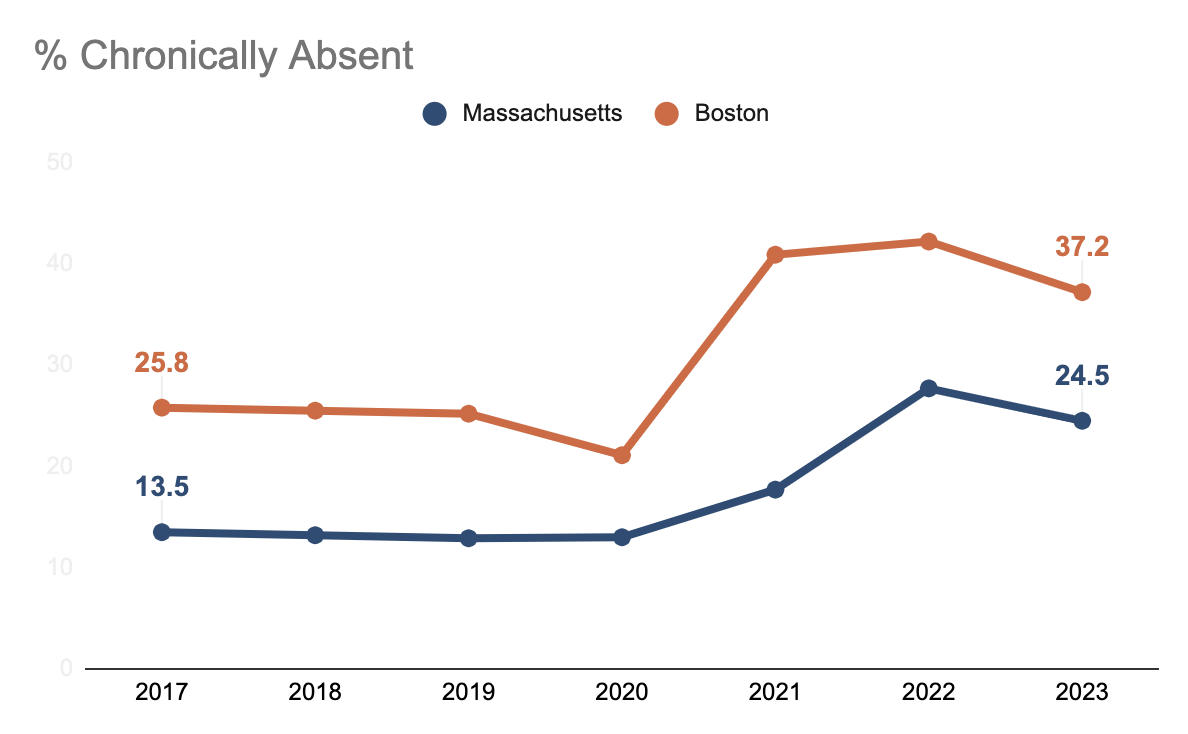FYI from BSF, 09.08.23
With most of Boston Public Schools starting yesterday, school is officially back in session.
Logistics are in place, and the traditional, annual play-by-play is posted.
Earlier this week, though, much of the attention focused on the students who would not be there. “Chronic absenteeism” got the New York Times treatment. It was unpacked in a thoughtful new Substack series. It even made its way into Mayor Wu’s new Substack newsletter, highlighting physically knocking on doors to get disengaged students back into school.
Interrupted learning and mental health have endured as central concerns. The question of "missing" students - the hundreds of thousands students who appeared to have left schooling - has been deeply investigated. But there has been little attention to understand and fix why kids are just not going to school as much as they used to.
Education, like many fields, really loves its own jargon. Chronic absenteeism - missing 10% or more school days - has that special quality of possessing a name so long and anodyne that it belies its gravity.
Ask yourself: aside from a very serious, unexpected issue, can you imagine yourself, your child, any child, missing school once every two weeks?
That is what chronic absenteeism equates to.
And, like so many other educational outcomes, the pandemic revealed and accelerated it as an issue. From the AP:
This is not an urban vs. suburban issue, a low-income vs. high-income issue. Attendance has become an issue everywhere. Chronic absenteeism doubled in Brookline, in Pittsfield, and down the Cape. It is up 500% in Wayland.
In 2021-2022, children in Massachusetts missed 13,523,278 days of school.
One may see some hope in what looks like improvement last year, but the last data point carries an asterisk. The 2022-2023 data is only collected through the beginning of March. With the nearly four more months of school that followed, the final attendance data will likely look a lot closer to 2021-2022.
There are a lot of bad things worse attendance creates, but the data backs the most common sense deduction: kids will learn less. There is a clear line of fit between MCAS achievement and chronic absenteeism.
The start of school is a time of renewal and optimism. New classrooms, new students, new teachers, new projects, new curriculum, new crayons, new experiences.
But this is all for not if we can’t figure out the very basic, very necessary task of getting kids to get to school more.
notes in the margin
That task is a lot harder this week; it is really hot.
Boston is faring better than most, with air conditioning in most of its buildings. Half-days and cancellations are happening all over the Commonwealth, and the Eastern seaboard. Climate change is a growing factor in why schools start at such different times around the country.
Boston has updated its school health guidance, and vaccination has cropped as a new problem - for recent Massachusetts migrants.
There are many steps left in the process, but the 2024 ballot question to remove the MCAS graduation requirement has passed constitutional muster. This reflects the Massachusetts Teachers Association’s increased legislative ambitions.
A reminder to always disaggregate one’s data: DC student assessment results have improved, but racial achievement gaps have widened.
Brockton Public Schools is looking for $14M.
The Massachusetts School Building Authority just got a lot more money, and is nudging districts towards green projects.
In this week’s installment of literacy coverage: bringing evidence-based practices into classrooms, the continued push in New York City, and the end of the Lucy Calkins era at Teachers College.
Even while there are open questions about the cost and value of higher education, ranking colleges always gets clicks.
other matters
Good schools don’t wait to teach.
Adams Elementary, PEAK I School, September 7, 2023
How? Because adults got ready.
Russell Elementary, PEAK II School, August Professional Development








